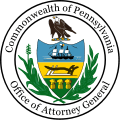Robert E. Woodside
| Robert E. Woodside, Jr. | |
|---|---|
 Circa 1951 | |
| Justice of the Pennsylvania Superior Court | |
|
In office 1953–1965 | |
| Pennsylvania Attorney General | |
|
In office March 7, 1951 – October 1, 1953 | |
| Preceded by | Charles J. Margiotti |
| Succeeded by | Frank Truscott |
| Pennsylvania House of Representatives | |
|
In office 1933–1941 | |
| Personal details | |
| Born |
June 4, 1904 Millersburg, Dauphin County, Pennsylvania |
| Died |
March 18, 1998 (aged 93) Sun City, Maricopa County, Arizona |
| Nationality | American |
| Political party | Republican |
| Spouse(s) | F. Fairlee Habbart |
| Alma mater | Dickinson College |
Robert Elmer Woodside, Jr. (June 4, 1904 – March 18, 1998) was a Pennsylvania, United States, politician and judge. He served four terms as a member of the State House of Representatives, a term as Attorney General, and a term on the Superior Court.[1][2]
Early life and political career
Woodside was born in Millersburg, Pennsylvania, the son of Robert E. and Ella Neitz Woodside. He attended Dickinson College, where he was a member of the Raven's Claw Society, graduating in 1926, and received a law degree from Dickinson School of Law in 1928. He married F. Fairlee Habbart in 1931, they would have three children.[3]
He was first elected to the State House of Representatives in 1932, and served four terms, until 1941. From 1939–41, he was Republican Floor Leader.[1] He was then appointed a judge on the Dauphin County Court of Common Pleas, where he served until appointed state Attorney General in 1951. He was appointed in 1953 to fill a vacancy on the state Superior Court, was elected to a full ten-year term in 1954, and lost his 1964 re-election bid.
In 1962, Woodside had been drafted to run for state Governor. Senator Hugh Scott strongly opposed Woodside, and ran for governor in opposition, only withdrawing when party leaders backed the then relatively unknown William Scranton.[4]
Slot machine raids
Slot machines were illegal in Pennsylvania, under an 1805 law prohibiting mechanical gambling devices. Despite this, slot machines were popular at political clubs as fund raisers.
In 1951, President Truman signed legislation banning interstate transportation of slot machines when contrary to state law.[5] Woodside, with Governor Fine's encouragement, undertook an enforcement campaign against the machines. He was the first state Attorney General to do so, sending the State Police on thousands of raids when local district attorneys refused to co-operate. Over 700 clubs folded after their slot machines were destroyed. In Erie, the mayor, police chief, and twelve others would be found guilty in 1954 of bribery and conspiracy in regards to the machines.[6]
Later life and career
Woodside was an adjunct professor at Dickinson School of Law (1970–90). He was a partner in the law firm Mette, Evans & Woodside.
He died in March 1998 while vacationing in Sun City, Arizona.[1][2]
Bibliography
- My Life and Town. Millersburg. 1979.
- Pennsylvania Constitutional Law. Sayre, Pa: Murelle Printing Company. 1985.
References
- 1 2 3 "Robert E. Woodside, Jr.". Pennsylvania House of Representatives. Retrieved 2015-09-16.
- 1 2 "Robert Woodside, 93, Ex-Pennsylvania Judge And State House Leader". The Morning Call. March 22, 1998.
- ↑ Allen, Alice, ed. (1952). The Pennsylvania Manual (1951–52). 90. p. 643.
- ↑ Klein, Philip Shriver; Hoogenboom, Ari Arthur (1980). A History of Pennsylvania. Penn State Press. p. 513.
- ↑ Public Papers of the Presidents of the United States: Harry S. Truman, 1951. 7. p. 201.
- ↑ Beers, Paul B. (2010). Pennsylvania Politics Today and Yesterday: The Tolerable Accommodation. Penn State Press. p. 176.
External links
| Legal offices | ||
|---|---|---|
| Preceded by Charles J. Margiotti |
Attorney General of Pennsylvania 1951–1953 |
Succeeded by Frank Truscott |
